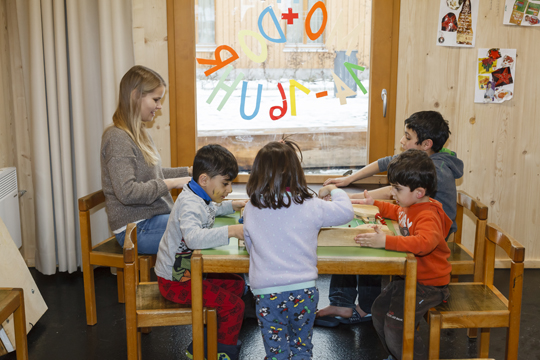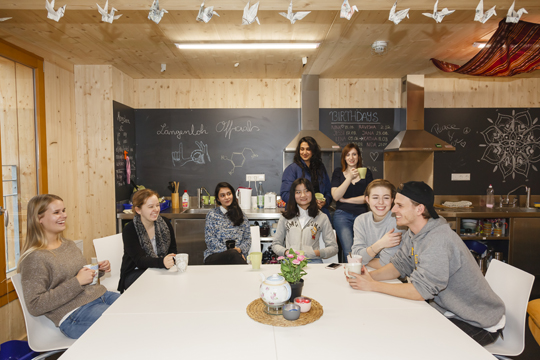Living in Längenloh
Freiburg, Mar 17, 2017
Längenloh – it sounds like some idyllic Swedish log cabin scene, with gnarled fruit trees and waist-high grass. Like Bullerby or Lönneberga, Längenloh could be some Astrid Lindgren children's paradise. But it's not. Längenloh Nord is located in the Freiburg district of Zähringen and is the only refugee shelter in town where students too are allowed to live.
Längenloh is a pilot project. Student Services Freiburg-Schwarzwald and the Helferkreis Zähringen cooperating to make it work. The idea is that integration starts with where you live. There is already more than enough container housing where refugees live on the periphery of society. "Längenloh is meant to show we can do this differently," says Renate Heyberger, deputy business manager of Student Services. Last August 150 refugees moved into the apartment buildings - among them, many children.
 Playing and making things: Volunteer students work with refugee children one afternoon per week. Photo: Ingeborg Lehmann
Playing and making things: Volunteer students work with refugee children one afternoon per week. Photo: Ingeborg Lehmann
The 72 students, who live in two of the seven buildings, moved in just before the start of semester in the middle of October 2016. This social project was originally meant to end when the winter semester did. In January 2017 the city authorities gave their approval for the students to stay another semester. But no longer than that, says the city. The reason - New regulations mean that the state of Baden-Württemberg has to provide refugees with about seven square meters more living space per person.
Plan with room for the unplanned
There is an atmosphere of student coziness in the huge open-plan kitchen on the first floor of house no. 2. Dishes are piled up on the sink. Four young women are sitting on a sofa on one side of the room. One of them has her legs pulled up. It's warmer that way. Two more are sitting at the kitchen table. They talk about how happy they are to be allowed to stay in Längenloh - for the time being. "We like it here," they say. Are they afraid of the refugees? "No, never were." Nina Allard says people here don't just live in the same place, they live together. The others nod and talk about parties they've had with their new neighbors - housewarmings, for St. Nikolaus' Day, or even just for the hell of it. "And we made Christmas cookies with the kids," Chiara Möser adds. Suddenly six children had appeared in the kitchen. They came to help with the baking but then decided they'd do the dishes instead. Nobody minded that the washing-up water also ended up on the kitchen floor. A lot of the contact between students and refugees in Längenloh is a spur of the moment thing. For instance, they strike up a conversation on the way to the tram stop or receive a spontaneous invitation to dinner with a refugee family, Allard says. That happened after the cookie-baking adventure. "We really only wanted to see the children home - and before we knew it, we were sitting with the family around the table, being served a delicious dinner." She says it was a lovely experience. "So open, so spontaneous." But other meetings in Längenloh are not left to chance. Social involvement is part of the project. Students give German lessons and handicrafts, go along to official appointments with the refugees, and organize games afternoons for the children in the project. There are groups for gardening, soccer, and drumming, and of course - this being Freiburg - a bicycle workshop. The Zähringen volunteers planned and launched most of the projects in Längenloh. The student join in - some because they have committed themselves to do so, others because they have the time and inclination.

A relaxed student atmosphere: Flatmates in house no. 2 gather in the kitchen. Photo: Ingeborg Lehmann
For instance, Chiara Möser is one of five tutors and organizes child minding. When she moved in, she undertook to do 20 hours of coordination work per month. For this she receives a small volunteer's payment from Student Services. She says she was active in helping refugees even before she came to Freiburg. So was Jana Zickler. While she was still in Bonn, looking for a place to live in Freiburg, she found Längenloh by chance on the internet.
Her first thought was "That's what I want." So she applied to live here. 25 of the 72 students went through a special selection process to be volunteers. Gernot Kist, of Student Services, says the organization received more than 400 applications. Students were chosen who had experience in aid to refugees or in other voluntary work. "We also considered students who had very good reasons for wanting to live in Längenloh," Kist adds.
It ends in summer
The tutors coordinate the student volunteers' work. They also have to meet with Student Services, the volunteers' association, and with the Caritas social service on location. But there are more students who have been helping out in Längenloh even though they don't have to. Like Jessi Nicholson. Her place in the student accommodation is not linked to volunteer work. But she assists with German lessons for mothers and children or with the mobile games bus which comes to the project every second Wednesday. There is no longer any great difference between official and unofficial volunteer students, Möser confirms. "We're all working side by side."
One wonders what will happen when the students have to move out after summer semester 2017. Möser doesn't think she would come to Längenloh often then - purely because of the distance; after all, this is the very edge of town. But that doesn't mean it was all for nothing. All the volunteers have a guaranteed place in student accommodation after the Längenloh project ends. That is part of their contract. And the city of Freiburg is considering the inclusion of student apartments in its plans for a new refugee housing complex. Because of Längenloh.
Stephanie Streif

